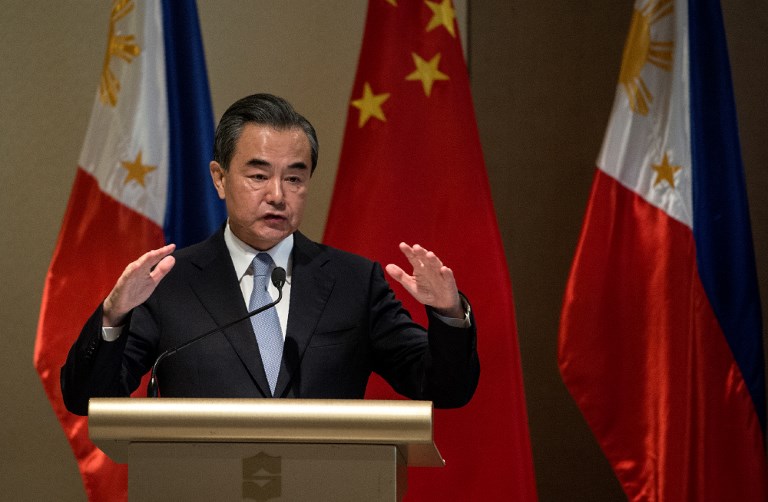Golez: What China proposes is against PH interest and our national security. We need the outsiders especially the US, Japan, India and Australia to counter balance China's history of aggressiveness in the South China Sea. Without the counterbalancing forces, China the bully will be left alone to harass the smaller ASEAN countries like the Philippines and Vietnam and freely grab more territory, including construction of military facilities on Scarborough Shoal. Recent history shows that China is the aggressor in the South China Sea and China is claiming and wants to grab 90% of our West Philippine Sea. INQUIRER.net philstar.com.
@inquirerdotnet "Wang Yi urges Asean vs outsiders" like US, Japan https://t.co/3ZKQGe7njC
From the article:
"Members of the Association of Southeast Asian Nation (Asean) need to “stand together” against regional outsiders who “want to stir up trouble” in the South China Sea, China’s top diplomat said on Tuesday."
Golez: It is China that has been stirring trouble in the South China Sea, not the outsiders who have no illegal claims.
"In his two-day visit to the Philippines, Chinese Foreign Minister Wang Yi said Association of Southeast Asian Nation (Asean) countries “have full capability and wisdom to handle differences” and “maintain stability in the South China Sea.”
“If there are still some non-regional forces in the region that don’t want to see stability in the South China Sea and they still want to stir up trouble in the South China Sea, we need to stand together and say no to them together,” Yi said in his speech."
Golez: The "stability" that China wants is the stability where China is the dominant, uncontested power which will continue grabbing more territory and natural resources in the South China Sea to the detriment and jeopardy of the other SCS coastal states like the Philippines, Vietnam, Malaysia and even Indonesia which although not a SCS claimant, has its Natuna area in jeopardy.
“In waters where there is overlapping of maritime rights and interests, if one party goes for unilateral development, then the other party will take the same actions and that might complicate the situation at sea that might lead to tensions and as a result nobody might be able to develop the resources,” he added.
Golez: What is Wang Yi talking about when he says "one party goes for unilateral development"? It is China that has been doing unilateral development with its massive reclamation and island building activities in violation of the spirit of the DOC 2002. Now China has huge military bases ready to be fully militarized in the SCS, one of them inside our EEZ.
"Yi met with his Filipino counterpart, Foreign Affairs Secretary Alan Peter Cayetano, to sign a memorandum of understanding between China and the Philippines. Yi said the situation in the South China Sea is “heading towards stability” because of the recent improvement in China and Philippines’ relationship."
Golez: To Mr. Wang Yi, "Heading towards stability" means when have set aisle the Hague ruling that awarded to us almost all our demands in the West Philippine Sea dispute.
Read more: http://globalnation.inquirer.net/159029/south-china-sea-wang-yiassociation-of-southeast-asian-nation-asean-alan-peter-cayetano#ixzz4nsWtmN4j
Follow us: @inquirerdotnet on Twitter | inquirerdotnet on Facebook
Wang Yi urges Asean to unite vs outsiders plotting to stir up trouble
Members of the Association of Southeast Asian Nation (Asean) need to “stand together” against regional outsiders who “want to stir up trouble” in the South China Sea, China’s top diplomat said on Tuesday.
In his two-day visit to the Philippines, Chinese Foreign Minister Wang Yi said Association of Southeast Asian Nation (Asean) countries “have full capability and wisdom to handle differences” and “maintain stability in the South China Sea.”
“If there are still some non-regional forces in the region that don’t want to see stability in the South China Sea and they still want to stir up trouble in the South China Sea, we need to stand together and say no to them together,” Yi said in his speech.
ADVERTISEMENT
“In waters where there is overlapping of maritime rights and interests, if one party goes for unilateral development, then the other party will take the same actions and that might complicate the situation at sea that might lead to tensions and as a result nobody might be able to develop the resources,” he added.
Yi met with his Filipino counterpart, Foreign Affairs Secretary Alan Peter Cayetano, to sign a memorandum of understanding between China and the Philippines.
Yi said the situation in the South China Sea is “heading towards stability” because of the recent improvement in China and Philippines’ relationship.
The implementation on the Declaration on the Declaration on the Conduct of the Parties in the South China Sea is making important progress and the framework for the Code of Conduct is also taking shape, the minister said.
Read more: http://globalnation.inquirer.net/159029/south-china-sea-wang-yiassociation-of-southeast-asian-nation-asean-alan-peter-cayetano#ixzz4nsbgWovP
Follow us: @inquirerdotnet on Twitter | inquirerdotnet on Facebook

No comments:
Post a Comment